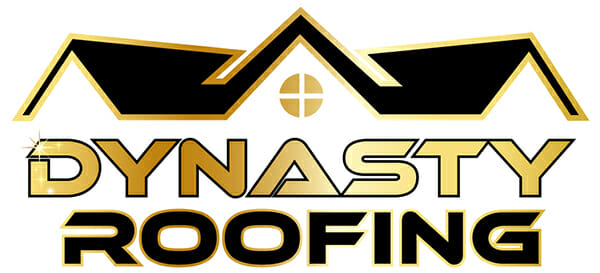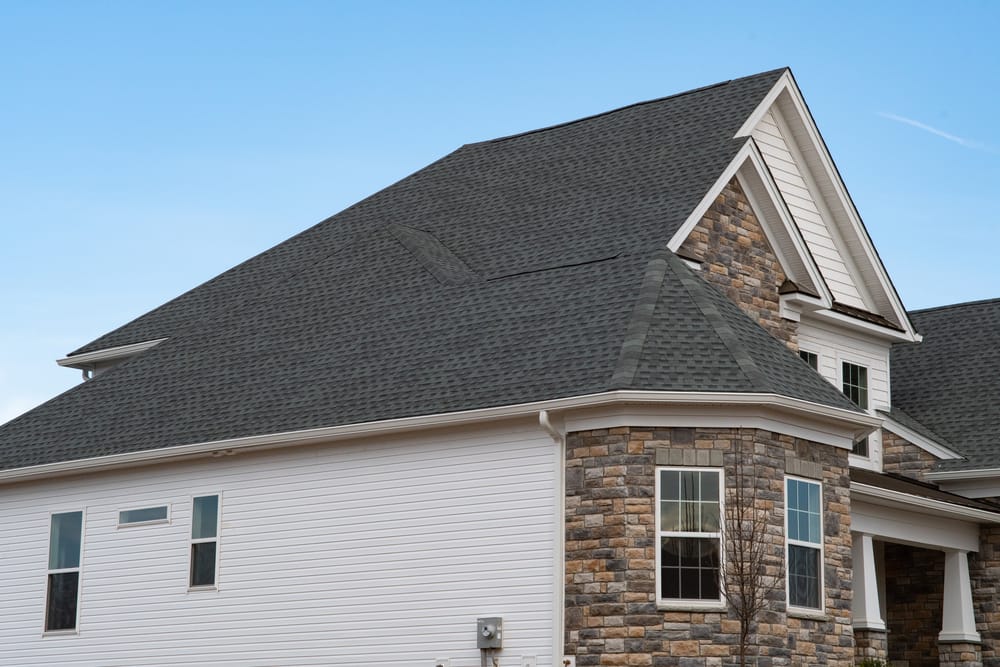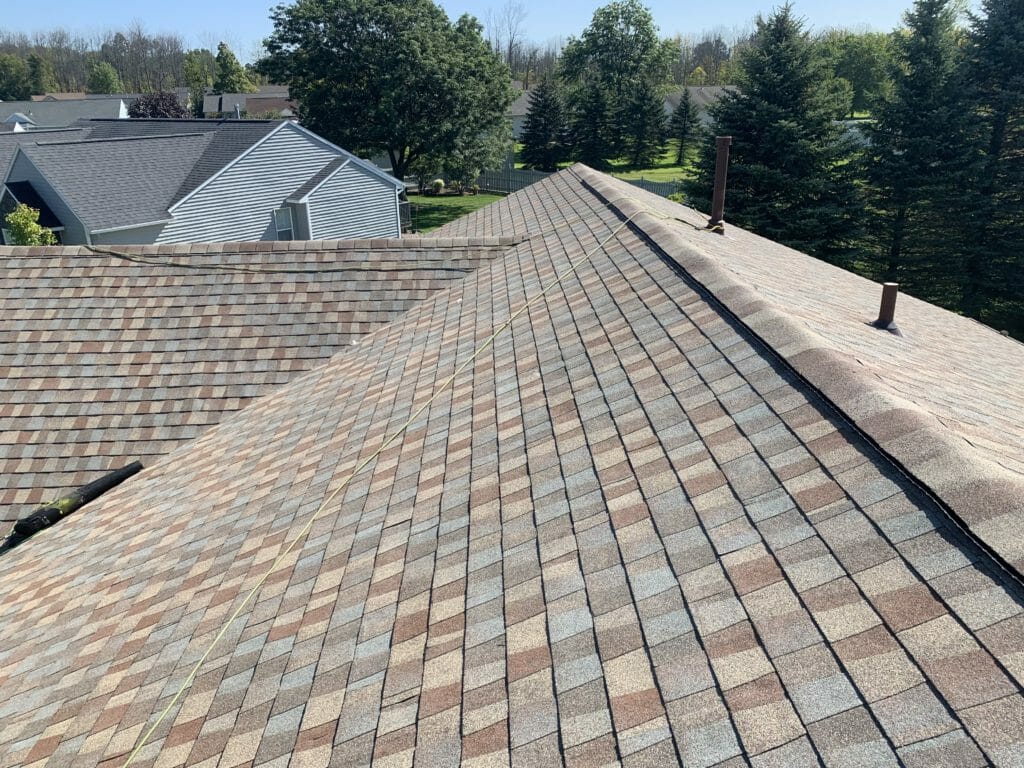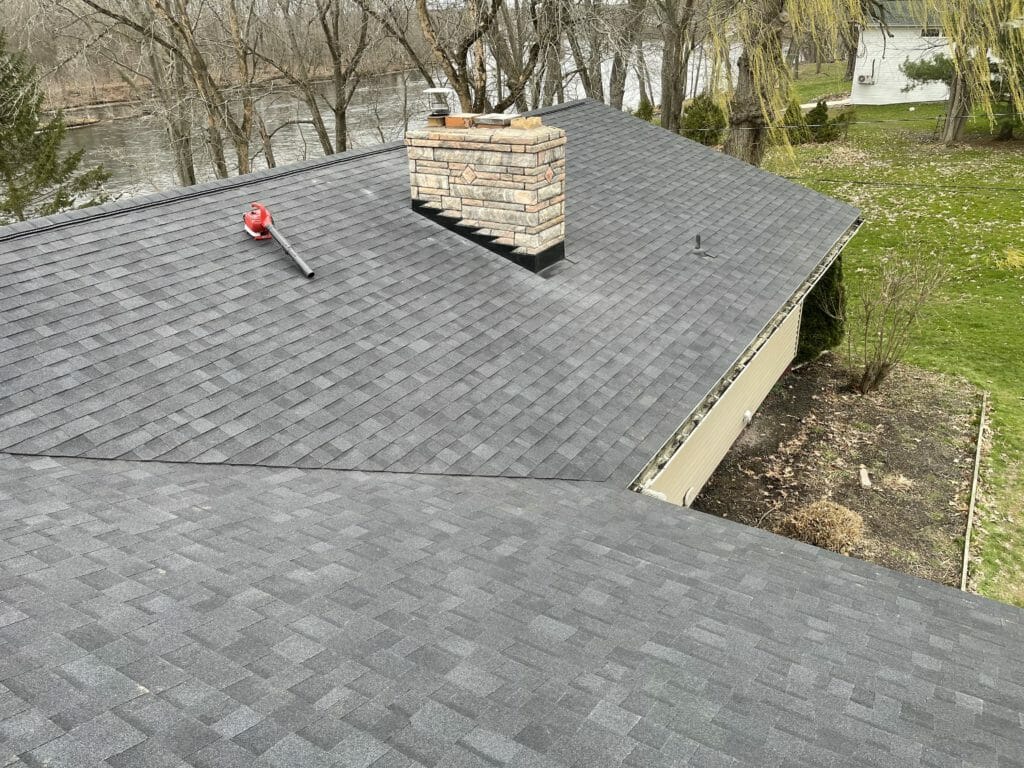Is your roof showing signs of wear and tear? Missing shingles, water damage, or a roof that’s over 20 years old could mean it’s time for a replacement. But how much will it cost, and what should you expect during the process?
A typical 1,700 square foot asphalt shingle roof replacement costs between $6,000 to $9,000. But factors like the size of your roof, materials, pitch, and location can all impact the final price tag.
In this post, we’ll break down the signs you need a new roof, the factors that affect replacement costs, and what to expect during the installation process. By the end, you’ll have a clear understanding of what it takes to replace your roof and how to prepare for this important home improvement project.
Table Of Contents:
- Signs You Need a Roof Replacement
- Roof Replacement Cost Factors
- Asphalt Shingle Roof Replacement Cost
- Metal Roof Replacement Cost
- Tile Roof Replacement Cost
- Hiring a Professional vs. DIY Roof Replacement
- Roof Replacement Process
- Conclusion
Signs You Need a Roof Replacement
Your roof is one of the most important parts of your home. It protects you from the elements and keeps your family safe and dry. But like all things, roofs don’t last forever. Eventually, you’ll need a roof replacement.
So how do you know when it’s time? Here are some telltale signs:
Loose, Cracked, Damaged or Missing Shingles
Take a look at your roof. Do you see any missing shingles? Or shingles that are cracked, curling, or otherwise damaged? If so, it’s a good idea to get a professional roof inspection.
A few damaged shingles here and there may not seem like a big deal. But left unchecked, they can lead to bigger problems down the road – like leaks and water damage.
Signs of Water Damage, Mold, or Rot
Speaking of water damage, that’s another major red flag. If you notice any water stains on your ceilings or walls, it’s time to investigate further.
The same goes for any signs of mold or rot, either inside your home or on the roof itself. These issues can quickly spiral out of control, so it’s best to nip them in the bud with a timely roof replacement.
Damaged Flashing
Flashing is the metal strips that seal the joints on your roof – like around chimneys, skylights, and vents. If the flashing is damaged or missing, it can leave your roof vulnerable to leaks.
In some cases, damaged flashing can be repaired. But if the problem is widespread, a full roof replacement may be necessary.
Current Roof Was Installed 20+ Years Ago
Even if your roof looks okay from the ground, it may still be nearing the end of its lifespan – especially if it’s more than 20 years old.
The average asphalt shingle roof lasts about 20-25 years. So if yours is getting up there in age, it’s probably time to start thinking about a replacement. An old roof is more prone to leaks and other problems.
Of course, these are just general guidelines. The best way to know for sure if you need a new roof is to get a professional opinion. A qualified roofing contractor can assess the condition of your roof and give you an expert recommendation.
Roof Replacement Cost Factors
So, you’ve determined that you need a new roof. But how much is this going to cost you? Well, the answer depends on a few key factors:
Size of the Roof
This one’s pretty straightforward – the bigger your roof, the more it’s going to cost to replace. Roofers typically charge by the square footage.
To get a rough idea of your roof’s size, measure the length and width of your house and multiply those numbers together. Then, add a little extra for overhangs and complex roof shapes.
Roofing Materials
The type of roofing material you choose will also have a big impact on the final cost. Asphalt shingles are the most common and economical option. But there are also pricier choices like metal, tile, and slate.
In general, you can expect to pay anywhere from $3 to $12 per square foot for roofing materials alone. The exact price will depend on the specific product you select.
Roof Pitch
The pitch or slope of your roof can also affect the cost of replacement. A steeper roof is more difficult and dangerous to work on, so it typically costs more.
Roofers often charge a premium for pitches greater than 6:12 (meaning the roof rises 6 inches for every 12 inches of horizontal run). So if you have a particularly steep roof, be prepared to pay a bit extra.
Location
Where you live can also influence your roof replacement cost. Labor and material prices vary from region to region.
In general, roofing costs tend to be higher in big cities and coastal areas. But there can be significant variation even within a single state. It’s always a good idea to get quotes from multiple local contractors to see what the going rate is in your area.
Roofing Removal
Before your new roof can be installed, the old one has to be removed. This is a labor-intensive process that can add significantly to the overall cost.
In most cases, roof removal is included in the price of replacement. But it’s still a good idea to ask your contractor about it specifically. Some may charge a separate fee for this service.
Additional Features
Finally, any special features or add-ons will also impact the cost of your new roof. Things like skylights, chimneys, and complex roof lines all take extra time and materials to work around.
If your roof has a lot of these features, expect to pay a bit more for replacement. The same goes for any necessary repairs to the underlying structure. Your contractor should be able to give you a more specific estimate after assessing the unique characteristics of your roof.
Asphalt Shingle Roof Replacement Cost
Asphalt shingles are by far the most popular roofing material in the U.S. They’re affordable, durable, and come in a wide variety of colors and styles. If you’re planning to replace your roof with asphalt shingles, here’s what you can expect in terms of cost:
Cost of an Asphalt Shingle Roof
On average, you can expect to pay between $3.50 and $6.00 per square foot for asphalt shingle roof replacement. So for a typical 1,700 square foot roof, that works out to a total cost of about $6,000 to $9,000.
Of course, this is just a general range. Your actual cost will depend on the specific shingles you choose and the other cost factors mentioned above (roof size, pitch, location, etc.).
Architectural Asphalt Shingles vs. Standard Asphalt Shingles
When shopping for asphalt shingles, you’ll have two main options: standard 3-tab shingles and architectural (or laminate) shingles.
Standard 3-tab shingles are the most basic and economical choice. They have a flat, uniform appearance and typically cost between $3.00 and $5.00 per square foot.
Architectural shingles are a step up in both quality and price. They’re thicker and more durable than standard shingles, and they have a more dimensional, textured look. Expect to pay $4.00 to $8.00 per square foot for architectural asphalt shingles.
So which type of shingle should you choose? It really depends on your budget and your aesthetic preferences. If you want the most affordable option, go with standard 3-tab shingles. But if you’re willing to spend a bit more for a higher-end look, architectural shingles are the way to go.
Metal Roof Replacement Cost
Metal roofing is another popular choice for both homes and businesses. It’s extremely durable, energy-efficient, and low-maintenance. If you’re considering a metal roof for your next replacement, here’s what you need to know about cost:
Cost of Metal Roofing
On average, you can expect to pay between $7.00 and $14.00 per square foot for a metal roof replacement. So for a typical 1,700 square foot roof, that works out to a total cost of about $12,000 to $24,000.
Again, this is just a general range. Your actual cost will depend on the specific type of metal roofing you choose (more on that below) and the other cost factors mentioned earlier.
Types of Metal Roofing Materials
There are several different types of metal roofing materials to choose from, each with its own unique benefits and price point. The most common options are:
- Steel: Steel is the most affordable metal roofing option, costing between $5.00 and $10.00 per square foot. It’s strong and durable, but it may rust over time if not properly coated.
- Aluminum: Aluminum roofing costs a bit more than steel, at $7.00 to $12.00 per square foot. It’s lightweight, corrosion-resistant, and available in a variety of colors.
- Copper: Copper is the most expensive metal roofing material, costing $15.00 to $25.00 per square foot. It’s extremely long-lasting and develops a beautiful patina over time.
- Zinc: Zinc roofing costs between $10.00 and $20.00 per square foot. Like copper, it’s very durable and develops an attractive patina with age.
The type of metal roofing you choose will depend on your budget, your aesthetic preferences, and the specific needs of your home or business. A qualified roofing contractor can help you weigh the pros and cons of each option and make the best choice for your project.
Spotting damaged shingles, water damage, or an aged roof over 20 years old? It’s likely time for a replacement. Costs vary based on size, materials, and extra features like skylights. Expect to pay $3-$6 per square foot for asphalt shingles and $7-$14 for metal roofing.
Tile Roof Replacement Cost
Tile roofs are often considered one of the best types of roofs. They have a unique, striking appearance and are incredibly sturdy and versatile, often lasting more than 100 years. Unfortunately, tile roofs are expensive, starting at around $15,000 and often exceeding $20,000.* We’ve detailed the various factors that affect tile roof costs below.
Cost by Tile Roof Material
The type of tile you choose has a big impact on the overall cost of your roof replacement. Here’s a breakdown of common tile materials and their average costs per square foot:
- Concrete tile: $4 – $10
- Terracotta tile: $6 – $15
- Ceramic tile: $10 – $18
- Slate tile: $10 – $30
As you can see, prices vary widely. Concrete is the most affordable option, while slate is the priciest (but also the most durable).
Cost by Tile Style
The style and shape of the tiles you select also play a role in the total cost. Some common styles and their price ranges include:
- Mission/barrel tiles: $7 – $10 per sq. ft.
- French tiles: $8 – $12 per sq. ft.
- Interlocking tiles: $5 – $8 per sq. ft.
- Riviera tiles: $6 – $9 per sq. ft.
Generally, more intricate styles like French or barrel tiles cost more than simple, flat interlocking tiles. The complexity impacts both the price of materials and the labor costs for installation.
Hiring a Professional vs. DIY Roof Replacement
Tile roof installation often requires removing your existing roof, whether it’s tile or another material. Roof removal costs around $1 to $5 per square foot. The price varies among roofing contractors, so ask about removal costs when you receive a quote.
Pros and Cons of Hiring a Professional
We recommend hiring a professional roofing company, as the job requires expertise and knowledge to determine how to best support the tiles and ensure proper ventilation and drainage. You’ll want a professional roofer to handle tile roof installation. Roofers charge anywhere from $45 to $75 per hour. Labor costs increase if you have a steep slope or unusual roof style because installation is more dangerous and takes longer to complete correctly. While hiring pros is pricier upfront, it ensures the job is done right. A shoddy DIY job can lead to leaks, structural damage, and costly repairs down the line. A DIY roof replacement could cost you between $2,500 to $5,000, according to HomeAdvisor, but it’s not recommended. While it would save you money upfront, roofing professionals have the proper safety precautions in place, equipment and experience to get the job done safely and correctly. DIY roof replacement could also end in costly roof repairs and you may need to hire a contractor anyway to redo the work. Unless you have roofing experience, it’s best to leave this job to the pros.
Finding a Reputable Roofing Contractor
Get quotes from at least three different roofers to compare costs and services. Read reviews, verify licensing and insurance, and ask for references. Cost is important, but don’t automatically go with the cheapest bid. The quality of materials and workmanship will impact your roof’s appearance and longevity. Spending more now could save you in repairs later.
Roof Replacement Process
A roof replacement is a big job, and there are several factors to think about before you call your local roofing company. Here’s an overview of what to expect: Before work begins, you’ll need to prep your home. This includes clearing your driveway so the roofers can park a disposal container, removing antennas or satellite dishes, and trimming overhanging tree branches. Inside, take down any pictures or wall hangings, as hammering can cause them to fall. Cover belongings in the attic with a tarp in case debris falls through.
Removing the Old Roof
The first step is removing your old roofing material down to the decking. The contractor will inspect the decking for any rot or damage and repair as needed before installing the new roof. Next, the roofers will install underlayment to create a water-resistant barrier. Then, they’ll carefully install the new tiles based on the pattern and style you chose, securing them to the roof to withstand the elements.
Final Inspection and Cleanup
Once the new roof is installed, the contractor will perform a final inspection to ensure everything is secure and no tiles are cracked or damaged. They’ll clean up any debris and haul it away, leaving your property clean and tidy. The contractor should go over care and maintenance instructions for your new roof. They may also provide or offer an extended warranty on materials and workmanship. *Cost figures in this article are based on 2023 reports from Angi, First American Roofing and Siding, and the National Roof Certification and Inspection Association.
Choosing the right tile material and style can greatly affect your roof replacement cost, with concrete being the most budget-friendly and slate on the higher end. Always weigh hiring a pro versus DIY—experts save future headaches despite higher initial costs. Get multiple quotes to ensure quality work within your budget.
Conclusion
Roof replacement is a significant investment, but it’s one that can protect your home and family for decades to come. Once you’ve figured out when it’s time to say goodbye to your old roof, grasped how different factors can affect the price tag of getting a new one, and got an idea of what replacing a roof entails, making decisions about upgrading becomes way less daunting.
Think of a new roof as more than just laying down some shingles. Getting this system up and running smoothly hinges on nailing the setup and picking top-notch materials. That’s why it’s essential to work with a reputable roofing contractor who can guide you through the process and ensure your new roof is installed correctly.
There’s nothing like the peace that comes with a brand-new roof keeping your home safe from weather woes. So don’t wait until it’s too late. If you suspect your roof needs replacing, take action today and invest in the long-term safety and value of your home.





